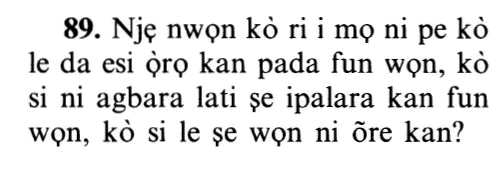20vs89
Select any filter and click on Go! to see results
أَفَلَا يَرَوْنَ أَلَّا يَرْجِعُ إِلَيْهِمْ قَوْلاً وَلَا يَمْلِكُ لَهُمْ ضَرّاً وَلَا نَفْعاً
Afala yarawna alla yarjiAAu ilayhim qawlan wala yamliku lahum darran wala nafAAan
Index Terms
Click to play
Yoruba Translation

Hausa Translation
Shin, to, bã su ganin cħwabã ya mayar musu da magana, kuma bã ya mallakar wata cũta a gare su, kuma bã ya mallakar amfãni?
Asbabu n-Nuzuul (Occasions of Revelation)
أَفَلَا يَرَوْنَ أَلَّا يَرْجِعُ إِلَيْهِمْ قَوْلًا ...
Did they not see that it could not return them a word (for answer),
This is about the calf. `Do they not see that it does not respond to them when they ask it and when they speak to it!'
... وَلَا يَمْلِكُ لَهُمْ ضَرًّا وَلَا نَفْعًا ﴿٨٩﴾
and that it had no power either to harm them or to do them good!
Meaning in their worldly affairs and matters of the Hereafter.
Ibn Abbas said,
"Nay, by Allah, the moaning sound of the calf was nothing but wind that would enter into its behind and come out of its mouth, thus causing it to make a sound.''
In a Hadith of Al-Fitun recorded from Al-Hasan Al-Basri, it is mentioned that;
this calf's name was Bahmut. In reference to the excuse of these ignorant people, they claimed that they were merely ridding themselves of the jewelry of the Copts. In the process of doing so, they cast the jewelry (into the pit of fire) and ended up worshipping the calf. Thus, they were seeking to rid themselves of something detestable, but wound up doing something even worse.
This is similar to an authentic narration reported from Abdullah bin Umar.
A man from Iraq asked him about the ruling of mosquitoes' blood if it get on one's garment.
The man wanted to know if it is permissible to pray in such a garment or not.
Ibn Umar replied by saying,
"Look at the people of Iraq. They killed the grandson of the Messenger of Allah, Al-Hussein, and yet they're asking about the blood of the mosquito.''
" أفلا يرون ألا يرجع إليهم قولا ولا يملك لهم ضرا ولا نفعا " أي العجل أفلا يرون أنه لا يجيبهم إذا سألوه ولا إذا خاطبوه ولا يملك لهم ضرا ولا نفعا أي في دنياهم ولا في أخراهم قال ابن عباس رضي الله عنهما لا والله ما كان خواره إلا أن يدخل الريح في دبره فيخرج من فمه فيسمع له صوت وقد تقدم في حديث الفتون عن الحسن البصري أن هذا العجل اسمه بهموت وحاصل ما اعتذر به هؤلاء الجهلة أنهم تورعوا عن زينة القبط فألقوها عنهم وعبدوا العجل فتورعوا عن الحقير وفعلوا الأمر الكبير كما جاء في الحديث الصحيح عن عبد الله بن عمر أنه سأله رجل من أهل العراق عن دم البعوض إذا أصاب الثوب يعني هل يصلي فيه أم لا فقال ابن عمر رضي الله عنهما انظروا إلى أهل العراق قتلوا ابن بنت رسول الله صلى الله عليه وسلم يعني الحسين وهم يسألون عن دم البعوضة .
"أفلا يرون أ" أن مخففة من الثقيلة واسمها محذوف أي أنه "لا يرجع" العجل "إليهم قولا" أي لا يرد لهم جوابا "ولا يملك لهم ضرا" أي دفعه "ولا نفعا" أي جلبه أي فكيف يتخذ إلها ؟
فقال الله تعالى محتجا عليهم : " أفلا يرون " أي يعتبرون ويتفكرون . في أنه " لا يرجع إليهم قولا " .
I'raab - grammatical analysis of the Qur'an
«أَفَلا» الهمزة للاستفهام والفاء عاطفة ولا نافية «يَرَوْنَ» مضارع مرفوع بثبوت النون والواو فاعل والجملة معطوفة «أن» مخففة من الثقيلة واسمها ضمير الشان تقديره أنه «لا» نافية «يَرْجِعُ» مضارع فاعله مستتر «إِلَيْهِمْ» متعلقان بيرجع «قَوْلًا» مفعول به وأن وما بعدها في تأويل مصدر في محل نصب مفعول به وجملة يرجع خبر أن «وَلا» الواو عاطفة ولا نافية «يَمْلِكُ» مضارع فاعله مستتر «لَهُمْ» متعلقان بيملك «ضَرًّا وَلا نَفْعاً» ضرا مفعول به ونفعا معطوف عليه والجملة معطوفة
